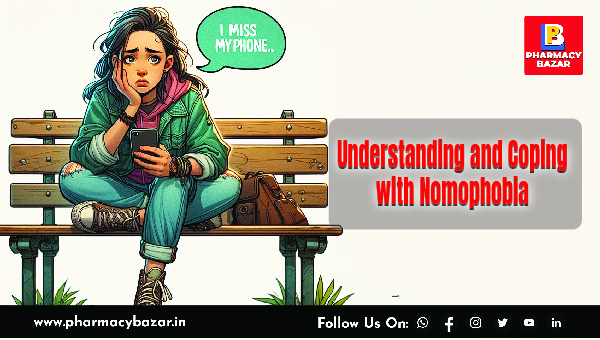Disconnected in a Connected World: Understanding and Coping with Nomophobia
Apr 25, 2024
In our hyper-connected world, the rise of nomophobia unveils a profound conundrum at the intersection of technology and mental health. Born from the fusion of 'no mobile' and 'phobia,' this modern malaise encapsulates the fear and anxiety stemming from separation from one's smartphone or the inability to use it.
NOMOPHOBIA: The fear of being without your mobile phone or being unable to use it. It's a modern-day anxiety that grips many, especially the younger generation. Let's delve into the life of a girl named **Lena**, who grapples with this digital dilemma.
Origins of Nomophobia:
This digital affliction first gained recognition in 2008, courtesy of a study by the UK Post Office, revealing that over half of mobile phone users in Britain experienced distress when detached from their devices. Since then, as smartphones have entrenched themselves in every facet of our existence, nomophobia has emerged as a global phenomenon.
Symptoms and Signs:
Nomophobia manifests in various ways, from incessant checking of phones to crippling anxiety at the thought of disconnection. Dependency on smartphones for validation and social interaction often leads individuals to avoid situations where they might be without their devices.
Causes of Nomophobia:
Our escalating reliance on technology, coupled with the fear of missing out and societal pressures to remain constantly connected, fuels the flames of nomophobia. Emotional attachment to our devices exacerbates this dependency, blurring the lines between self and smartphone.
Impact on Mental Health:
The repercussions of nomophobia reverberate through our mental landscape, fueling stress, disrupting sleep, fostering social isolation, and impeding productivity. The quest for perpetual connectivity paradoxically leaves individuals feeling increasingly disconnected from the tangible world around them.
Coping Strategies:
Amidst the digital deluge, adopting coping strategies becomes imperative. From digital detoxes to setting boundaries and embracing mindfulness, there are myriad approaches to reclaiming agency over our relationship with technology. Seeking professional support is paramount for those grappling with severe nomophobic symptoms.
In Conclusion:
Nomophobia epitomizes the intricate dance between humans and technology in the 21st century. While smartphones offer unprecedented connectivity, they also pose profound challenges to our mental well-being. By fostering self-awareness, setting boundaries, and nurturing resilience, individuals can chart a course towards a healthier, more balanced relationship with technology. Let us embark on this journey with mindfulness and purpose, reclaiming control over our digital destinies.
DISCLAIMER: This article is the property of Pharmacy Bazar and is protected by copyright laws. The information provided in this article is for educational and informational purposes only and is not intended to be a substitute for professional medical advice, diagnosis, or treatment. Always seek the advice of a qualified healthcare provider with any questions you may have regarding a medical condition. Never disregard professional medical advice or delay in seeking it because of something you have read in this article. The author and publisher of this article do not endorse any specific treatments, procedures, or products mentioned in this article
Recent Post

Blood Cancer: Early Warning Signs and Diagnosis

Understanding Gallstones: Causes, Symptoms, and Treatment Options

Navigating Diabetes Medications: Benefits and Side Effects

Revolutionizing Cancer Treatment: How Unleashing T Cells' Energy Could Transform Immunotherapy

The Power of Lower Back Stretches: Benefits and Best Yoga Asanas for a Healthy Spine

8 Health Conditions That Could Be Due to Magnesium Deficiency

Unlocking Brain Health: How Lifestyle Choices Impact Cognitive Functions

When Speech Takes a Surprising Turn: Unraveling Foreign Accent Syndrome

The Optimal Time to Take Your Vitamin D Supplement: Insights and Best Practices

Beyond Diabetes: Unveiling the Hidden Health Risks of Insulin Resistance

